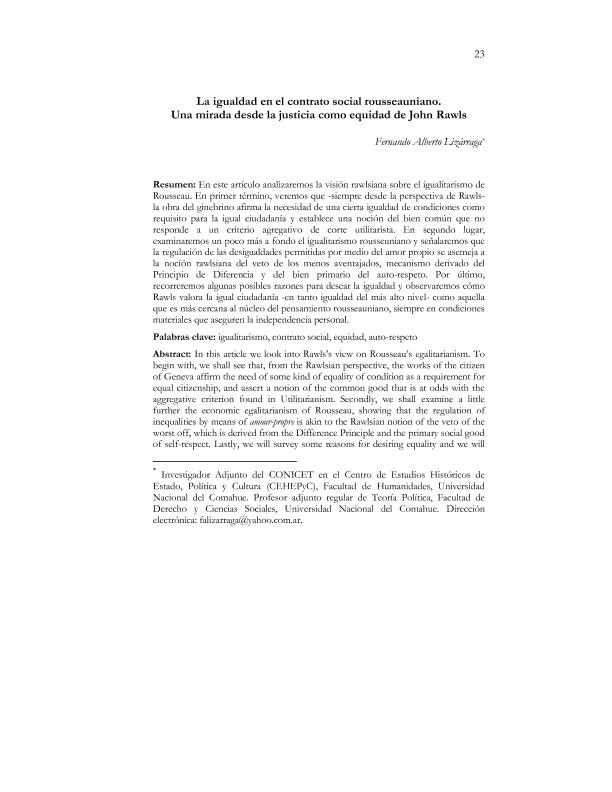Mostrar el registro sencillo del ítem
dc.contributor.author
Lizárraga, Fernando Alberto

dc.date.available
2018-01-10T20:36:51Z
dc.date.issued
2014-06
dc.identifier.citation
La igualdad en el contrato social rousseauniano: una mirada desde la justicia como equidad de John Rawls; ARFil; Tópicos; 27; 6-2014; 23-45
dc.identifier.issn
1668-723X
dc.identifier.uri
http://hdl.handle.net/11336/32908
dc.description.abstract
En este artículo analizaremos la visión rawlsiana sobre el igualitarismo de Rousseau. En primer término, veremos que -siempre desde la perspectiva de Rawls-la obra del ginebrino afirma la necesidad de una cierta igualdad de condiciones como requisito para la igual ciudadanía y establece una noción del bien común que no responde a un criterio agregativo de corte utilitarista. En segundo lugar, examinaremos un poco más a fondo el igualitarismo rousseuniano y señalaremos que la regulación de las desigualdades permitidas por medio del amor propio se asemeja a la noción rawlsiana del veto de los menos aventajados, mecanismo derivado del Principio de Diferencia y del bien primario del auto-respeto. Por último, recorreremos algunas posibles razones para desear la igualdad y observaremos cómo Rawls valora la igual ciudadanía -en tanto igualdad del más alto nivel- como aquella que es más cercana al núcleo del pensamiento rousseauniano, siempre en condiciones materiales que aseguren la independencia personal.
dc.description.abstract
In this article we look into Rawls's view on Rousseau's egalitarianism. To begin with, we shall see that, from the Rawlsian perspective, the works of the citizen of Geneva affirm the need of some kind of equality of condition as a requirement for equal citizenship, and assert a notion of the common good that is at odds with the aggregative criterion found in Utilitarianism. Secondly, we shall examine a little further the economic egalitarianism of Rousseau, showing that the regulation of inequalities by means of amour-propre is akin to the Rawlsian notion of the veto of the worst off, which is derived from the Difference Principle and the primary social good of self-respect. Lastly, we will survey some reasons for desiring equality and we will see how Rawls, from his own political conception, considers that equal citizenship, as equality of the highest level, is the conception closest to the core of Rousseau's thoughts, given certain material conditions capable of securing personal independence.
dc.format
application/pdf
dc.language.iso
spa
dc.publisher
ARFil
dc.rights
info:eu-repo/semantics/openAccess
dc.rights.uri
https://creativecommons.org/licenses/by-nc-sa/2.5/ar/
dc.subject
Igualitarismo
dc.subject
Contrato Social
dc.subject
Equidad
dc.subject
Auto-Respeto
dc.subject.classification
Ciencia Política

dc.subject.classification
Ciencia Política

dc.subject.classification
CIENCIAS SOCIALES

dc.title
La igualdad en el contrato social rousseauniano: una mirada desde la justicia como equidad de John Rawls
dc.type
info:eu-repo/semantics/article
dc.type
info:ar-repo/semantics/artículo
dc.type
info:eu-repo/semantics/publishedVersion
dc.date.updated
2018-01-05T16:23:36Z
dc.journal.number
27
dc.journal.pagination
23-45
dc.journal.pais
Argentina

dc.description.fil
Fil: Lizárraga, Fernando Alberto. Universidad Nacional del Comahue. Facultad de Humanidades. Centro de Estudios Históricos de Estado, Politica y Cultura; Argentina. Consejo Nacional de Investigaciones Científicas y Técnicas; Argentina
dc.journal.title
Tópicos
dc.relation.alternativeid
info:eu-repo/semantics/altIdentifier/url/http://www.redalyc.org/articulo.oa?id=28831681002
dc.relation.alternativeid
info:eu-repo/semantics/altIdentifier/url/http://ref.scielo.org/qbmhm5
Archivos asociados
